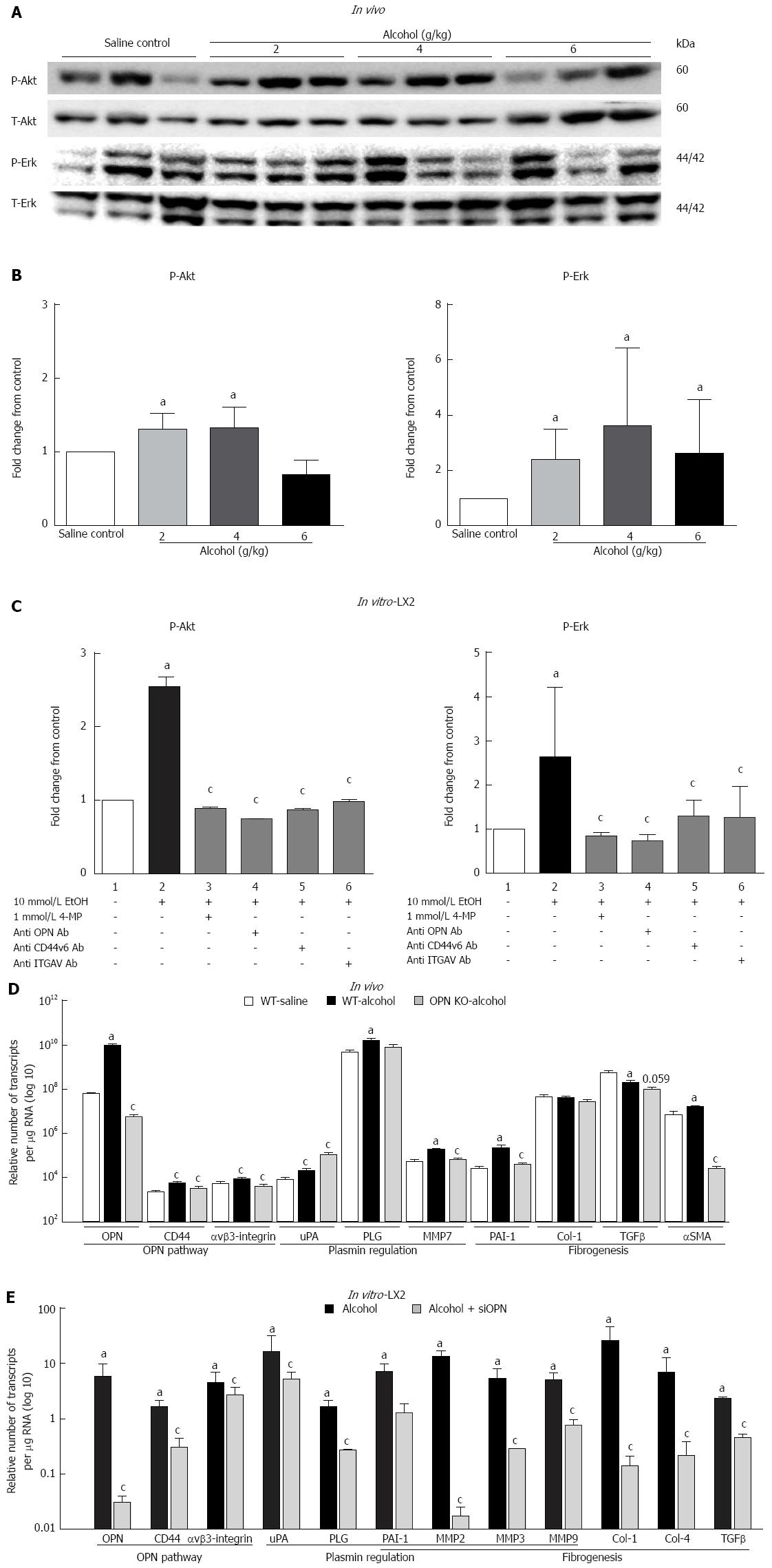Copyright
©2014 Baishideng Publishing Group Inc.
World J Gastroenterol. Sep 28, 2014; 20(36): 13088-13104
Published online Sep 28, 2014. doi: 10.3748/wjg.v20.i36.13088
Published online Sep 28, 2014. doi: 10.3748/wjg.v20.i36.13088
Figure 3 Over-expression of Osteopontin mediates alcohol-induced cell signalling and downstream transcription of target genes in in vivo and in vitro experimental models.
A, B: In vivo: Compared to saline control, significant but moderate increase was observed in P-Akt/T-Akt ratio (WB, top panels) with 2 and 4 g/kg alcohol (P-Akt graph) and P-Erk/T-Erk ratio (WB, bottom panels) with all doses of alcohol (P-Erk graph). Note: individual mice showing high P-Erk had low P-Akt and vice versa. aP < 0.05 vs saline control; C: In vitro: Compared to untreated cells (lane 1), alcohol (10 mmo/L per 4 h) (lane 2) significantly induced P-Akt (P-Akt graph) and P-Erk (P-Erk graph) in LX2, normalized to total -Akt (T-Akt) and -Erk (T-Erk), respectively. Phosphorylation of both Akt and Erk was abrogated by inhibiting alcohol metabolism through 4-methyl pyrazole (4-MP) (lane 3) and blocking OPN pathway by neutralizing antibodies to OPN (lane 4), CD44v6 (lane 5) and αvβ3-integrin (ITGAV) (lane 6). aP < 0.05 vs untreated cells; cP < 0.05 vs alcohol; D: In vivo: In WT mice, mRNA expression (transcripts per μg total RNA) for OPN pathway (OPN, CD44, αvβ3-integrin), plasmin regulation (ìPA, PLG, MMP7) and fibrogenesis (PAI-1, α-SMA) related molecules were significantly induced by alcohol (6 g/kg, dark bars) compared to saline control (white bars). TGFβ mRNA was down-regulated and Col-1 was not affected. mRNA expression of most molecules was significantly inhibited in OPN knockout mice (grey bars) compared to WT mice in the presence of alcohol. ìPA mRNA expression significantly increased in OPN-/- mice and Col-1 mRNA did not change. aP < 0.05 vs control; cP < 0.05 vs alcohol; E: In vitro: Alcohol induced mRNA expression (fold-change from no treatment/scramble control) for OPN, CD44v6, αvβ3-integrin, ìPA, PLG, PAI-1, MMP2, MMP3, MMP9, Col-1, Col-4 and TGFβ (dark bars, presented as fold-change from no treatment control). Silencing OPN in LX2 cells with siOPN significantly inhibited mRNA expression of these molecules, except αvβ3-integrin and ìPA in the presence of alcohol (grey bars, presented as fold-change from scrambled control). aP < 0.05 vs control; cP < 0.05 vs alcohol.
-
Citation: Seth D, Duly A, Kuo PC, McCaughan GW, Haber PS. Osteopontin is an important mediator of alcoholic liver disease
via hepatic stellate cell activation. World J Gastroenterol 2014; 20(36): 13088-13104 - URL: https://www.wjgnet.com/1007-9327/full/v20/i36/13088.htm
- DOI: https://dx.doi.org/10.3748/wjg.v20.i36.13088









